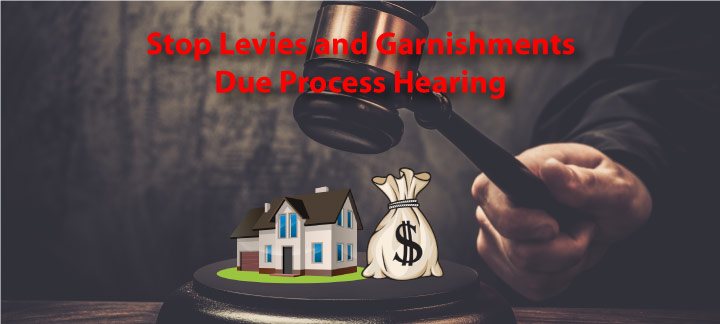Collections Due Process Hearing
As an experienced tax attorney, Bill Hartsock can represent you if you receive an IRS collections lien notice or notice of levy. In some cases, it may be advantageous to request a Collections Due Process Hearing if you disagree with the collection actions taken by the IRS.
What is a Collections Due Process Hearing?
A Collections Due Process Hearing is a hearing which allows taxpayers to be heard before the IRS Office of Appeals. Under section 6330 of the Internal Revenue Code, taxpayers have the right to a due process hearing before the deprivation of their property.
You can request a Collections Due Process Hearing when you receive one of the following notice: from the IRS: 1) Final Notice of Intent to Levy and Your Right to a Hearing; 2) Notice of Federal Tax Lien Filing and Your Right to a Hearing; 3) Notice of Levy and Notice of Your Right to a Hearing; 4) Notice of Jeopardy Levy and Right of Appeal; 5) Notice of Levy on State Tax Refund, Notice of Your Right to a Hearing. http://www.aicpa.org/Publications/TaxAdviser/2013/July/Pages/TPP_July2013-story-03.html.aspx.
If you receive a lien notice from the IRS, you must request a hearing within 30 days. In the case of an IRS levy, taxpayers have the right to a hearing in United States Tax Court within 30 days of receiving any kind of IRS levy notice for each tax assessment within a tax period. During the 30 day period from receiving the levy notice, the taxpayer may request a hearing before the levy takes effect.
How Do I Request a Collections Due Process Hearing?
To request a hearing after the 30-day period from receiving the lien or levy notice, you must postmark your request on or before the end of the one-year period after the date of the levy notice or on or before the end of the one-year period plus 5 business days after the filing date of the Notice of Federal Tax Lien. Even if you miss the deadline to request a hearing, an equivalent hearing may still be available to you. http://www.irs.gov/pub/irs-pdf/p1660.pdf.
Can an Attorney Represent Me at a Collections Due Process Hearing?
Yes, a tax attorney can represent you at a Collections Due Process Hearing. You can also represent yourself. If you wish to have an attorney appear as your authorized representative, you must file a proper IRS Form 2848 for Power of Attorney. A tax lawyer who is knowledgeable about levies and liens can help you decide how to proceed if you wish to avoid a collection action taken by the IRS. In addition, a tax attorney can make all appropriate arguments on your behalf during the hearing in order to obtain the most favorable outcome possible. For example, during a Collections Due Process hearing, your tax attorney may raise any relevant issue relating to the unpaid tax or the proposed levy, including appropriate spousal defenses, challenges to the appropriateness of collection actions, and offers of collection alternatives.
During the Collections Due Process Hearing, your attorney can also challenge the existence or amount of the underlying tax liability for any tax period.
The Tax Lawyer - William D. Hartsock has been successfully assisting clients with Collections Due Process Hearings since the early 1980s. Mr. Hartsock offers free consultations with the full benefit and protections of attorney client privilege to help people clearly understand their situation and options based on the circumstances of their case. To schedule your free consultation simply fill out the contact form found on this page, or call (858) 481-4844.



Comments (0)